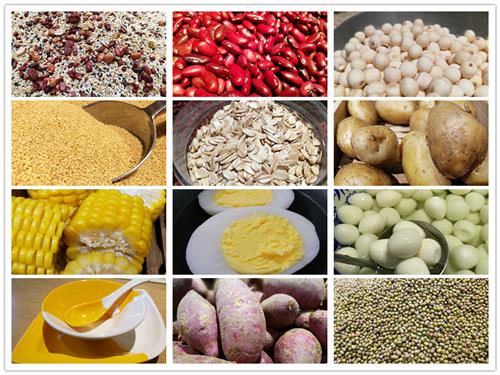What foods to eat in winter
The weather is getting colder and colder. In cold weather, many people who eat will love to choose some warm and tonic foods to adjust their daily diet in order to achieve physical fitness and warm-ups.
Supplement foods rich in calcium and iron

People are afraid of cold and the body's intake of certain minerals is less related. Such as calcium content in the human body, can directly affect the myocardium, blood vessels and muscle flexibility and excitability; iron deficiency in the blood is an important cause of iron deficiency anemia, often showing low calorie production, low body temperature and so on. Therefore, supplementing foods rich in calcium and iron can improve the body's ability to keep out the cold. Calcium-containing foods mainly include milk, soy products, kelp, seaweed, shells, oysters, sardines, shrimp, etc.; iron-containing foods are mainly animal blood, egg yolks, liver, soybeans, sesame, black fungus and red dates.
Multi-medium and moderate warm food
First of all, eat more staple foods, appropriately choose high-calorific and warm foods, mainly dog ​​meat, lamb, beef, chicken, shrimp, longan, red dates, etc., these foods are rich in protein and fat, heat production, for the body Deficiency and yang deficiency are particularly beneficial.
More fruits and proper amount of yin food
In order to make “Yin Ping Yang Secret†and prevent fire, it is also advisable to serve food products such as quail, turtle, duck, goose, quail, fungus, etc. in the winter, especially for the middle-aged and the elderly who are frail, sick, and loss-making, in order to seek yin and yang. balance. In addition, fruit should be replenished every day. Eat more fruits such as grapefruit and apples, which is good for resisting winter dryness.
More vegetables and increased vitamin A
In addition, to ensure the supply of vitamins, especially increase the intake of vitamin A and vitamin C, can enhance cold resistance and adaptability to the cold, and has a good protective effect on blood vessels. Vitamin C, mainly from fresh fruits and vegetables, vitamin A mainly from animal liver, carrots, dark green vegetables.
Eating more methionine foods
Sesame seeds and sunflower seeds provide the necessary elements of cold resistance. Cold weather increases the demand for methionine in the body. Methionine can provide a series of methyl groups necessary for adapting to the cold through transfer. Therefore, more food containing methionine should be taken in winter. Such as sesame, sunflower seeds, dairy products, yeast, leafy vegetables and so on.
Appropriate increase in spicy cold food
Eat spicy can be cold. Pepper contains capsaicin, ginger contains aromatic essential oils, and pepper contains piperine. They are all spicy foods, eat more in the winter, not only can increase appetite, but also promote blood circulation, improve the ability to keep out the cold.
Eat kelp in winter is not afraid of cold
Why does seaweed kelp protect against cold? From the perspective of Chinese medicine, seawater is cool and cold, and the seaweed that grows on it has extremely strong cold resistance. Kelp and taste of salty, long-term consumption of warm kidney function. Therefore, eating kelp in winter can increase the body's ability to resist cold.
In addition, people are afraid that the cold is related to the body's intake of certain minerals. Supplementing foods rich in calcium and iron can improve the body's ability to keep warm. The kelp is the treasure house where humans take calcium and iron. Each 100 grams of kelp contains up to 1177 milligrams of calcium and up to 150 milligrams of iron, so eating kelp in winter has important health benefits for children, women, and the elderly.
Stainless Steel Door Stop,Door Stops,Decorative Door Stops,Wall Door Stop
Ningbo Hengchieh Locking Technology Co., Ltd. , https://www.hengchieh.com